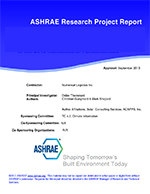
RP-809 — Evaluation of Optimal Control for Ice Storage Systems
- Comments Off on RP-809 — Evaluation of Optimal Control for Ice Storage Systems
- ASHRAE
Thermal energy storage systems are effective in reducing the operating cost of cooling equipment. By operating the refrigeration equipment during off-peak hours to recharge the storage tank and discharge it during onpeak hours, a significant fraction of cm-peak electrical demand and energy consumption is shifted to off-peak periods. Cost savings are obtained because utility rates favor leveled energy consumption patterns.
Two types of thermal energy storage media exist: single-phase and two-phase. Chilled-water systems are single-phase as the contents of the tank is cooled without undergoing a phase change. Eutectic salt systems employ a salt that changes from the dissolved to solid state at a temperature above the freezing point of water. These two-phase systems provide a high storage density without the need for operating the chiller at low evaporator temperatures but require the usage of expensive chemicals. Ice storage systems feature a high storage density using a cheap storage medium, i.e. water, but require the chiller to operate at lower efficiencies when making ice. This research deals exclusively with the characteristics and performance of ice storage systems.
Product Details
- Published:
- 1995
- Number of Pages:
- 246
- File Size:
- 1 file , 7.4 MB
- Product Code(s):
- D-RP-809

